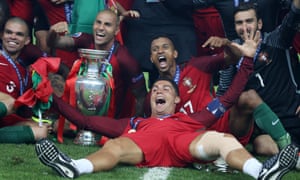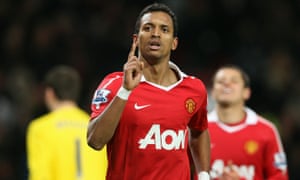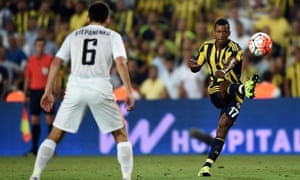There were fewer shades of grey at the beginning of the following season under Moyes’s successor, Louis van Gaal. “He told me that, if I wanted to stay to fight for a position, then good but I would not be his first option or maybe even the second,” Nani says. “I said: ‘No. I have been here for many years, I have been very important to this club and I think it’s time to decide.’ I wanted to play every game in the starting XI.”
And so Nani ended a fitful United career, marked by flashes of genius but defined by the feeling that he never delivered on his potential. He went on a season-long loan back to Sporting and then signed for Fenerbahce in July 2015 for £4.25m. He took with him a reputation for flakiness and, if he had become trapped in a spiral of decline at United, there were few people in England to predict that he would rise again.
Nani has risen again. In a rare interview, with the Guardian, the 29-year-old can reflect on a £7.2m transfer from Fenerbahce to Valencia and there is excitement before the start of La Liga. His new team kick off at home to Las Palmas on Monday night.
But there is something else, something fundamental. The four-time Premier League champion and one-time Champions League winner describes it as the highlight of his career. He is now a European champion with Portugal.
Nani enjoyed an outstanding tournament in France, scoring three and setting up one more. But there was particular resonance to a moment from the final against France. It came when Cristiano Ronaldo, the talisman and Nani’s one-time house-mate in Manchester, sat down on the turf with tears in his eyes. His game was over because of a knee injury and he looked for Nani to pass on the armband.
It was the biggest game in Portuguese football history – never before had they won a major final – and from the 25th minute Nani would carry the captaincy and the responsibility for driving on the younger players like Raphaël Guerreiro, Renato Sanches and João Mario. Nani’s critics have said that he does not have the broadest of shoulders. Here, he led his country to glory.

“The thing that changed was that I was shouting to my players, to the younger players, giving them motivation. And it was fantastic. We deserved to win and it’s in history now. It’s something we’ll remember for ever. It’s once-in-a-lifetime.”
After the substitute Eder’s extra-time goal had secured the 1-0 win, Nani was overtaken by the emotion. The words tumble out now and there is hyperbole but the over-riding impression is that the magnitude of the achievement has yet to sink in. The moments after the full-time whistle were a blur and Nani says he slept for “maybe one hour” that night, as he was so excited about getting back to Lisbon for the open-top bus parade.
“It was the best thing of my career because it was for my country,” Nani adds. “Every player wants to win something for his country. It’s amazing how the Portuguese people lived this and the feeling that they gave to us when we got home was incredible. We proved a lot of doubters wrong. We drew our three group games but when it mattered the most, we were decisive.”
Nani has long been driven by the desire to prove people wrong; from his childhood in Lisbon’s impoverished and crime-ridden Amadora slum district, when he told his friends he would play for United and they were not convinced. “I remember watching United’s Champions League final win over Bayern Munich in 1999 and, of course, when you watch teams like that, your dream is to play for them,” he says. “I said to my friends: ‘One day, I will play there.’ And the dream came true. If you believe and work hard, you can achieve your dreams.”

Nani says “United gave me all that I have in this life”, and his affection for Sir Alex Ferguson endures. “I see him like a father, angry and shouting at you one minute but in the next, patting his hand on your head and saying: ‘Come on, son.’
“It was hard to deal with at first, because you don’t know him and his strong ways but when you know him, you learn it is for your benefit. If today I have a strong mentality, it’s a lot to do with him.”
Perhaps Nani was frustrating at Old Trafford because his potential was so rich and, consequently, the bar was set so high. It is also true that he was not helped by the comparisons with Ronaldo, who had arrived at United from Sporting in 2003.
“They were expecting me to be the next Ronaldo but that’s unfair,” he says. “We are different players, different personalities. Maybe it was a mistake to compare us.”
Nani moved in with Ronaldo for a month or so when he first arrived in Manchester and, disappointingly, he is not willing to reveal any of his friend’s bad habits. “We just had great moments,” he adds. “I needed somebody to help me to deal with things in Manchester and he was very important to me.”

“Maybe I could have played more games but the routine at that club, especially under Ferguson, was to alternate the players,” Nani says. “Everyone was part of the team. I played in big games and I played in not so big games. I played in finals. I had fantastic performances and I had not so great performances. This is football.
“What I have in my mind is just the great moments I had in Manchester; the fantastic goals that I scored against top teams. It’s what my friends remember and it’s what the fans remember, when they write to me. They don’t remember the bad things.”
Valencia have been keen to hype their new signing and have shot an in-house documentary entitled El Fenémeno de Nani. It might seem a little over-the-top but in reality he is a decorated former United player who has just helped his country to the European Championship.
After his moment of triumph at Stade de France Nani said he thought about his journey to the top – from Amadora and the days at junior level when Portugal’s leading clubs would overlook him for being too small and skinny. He eventually changed Sporting’s opinion of him at a trial when he was 16. “Where I grew up it was very difficult for kids,” Nani says. “Some of them would go the wrong way – stealing, smoking, drugs and everything, but I never wanted to go that way. My way was that I was their friend, I saw them do the wrong things but I was with them. And, after, I go to play football. We had nothing when I was young. We were very poor but all my life I have been a fighter. I think that’s why I am here, because I will fight until the end.”







No comments:
Post a Comment
Ashy